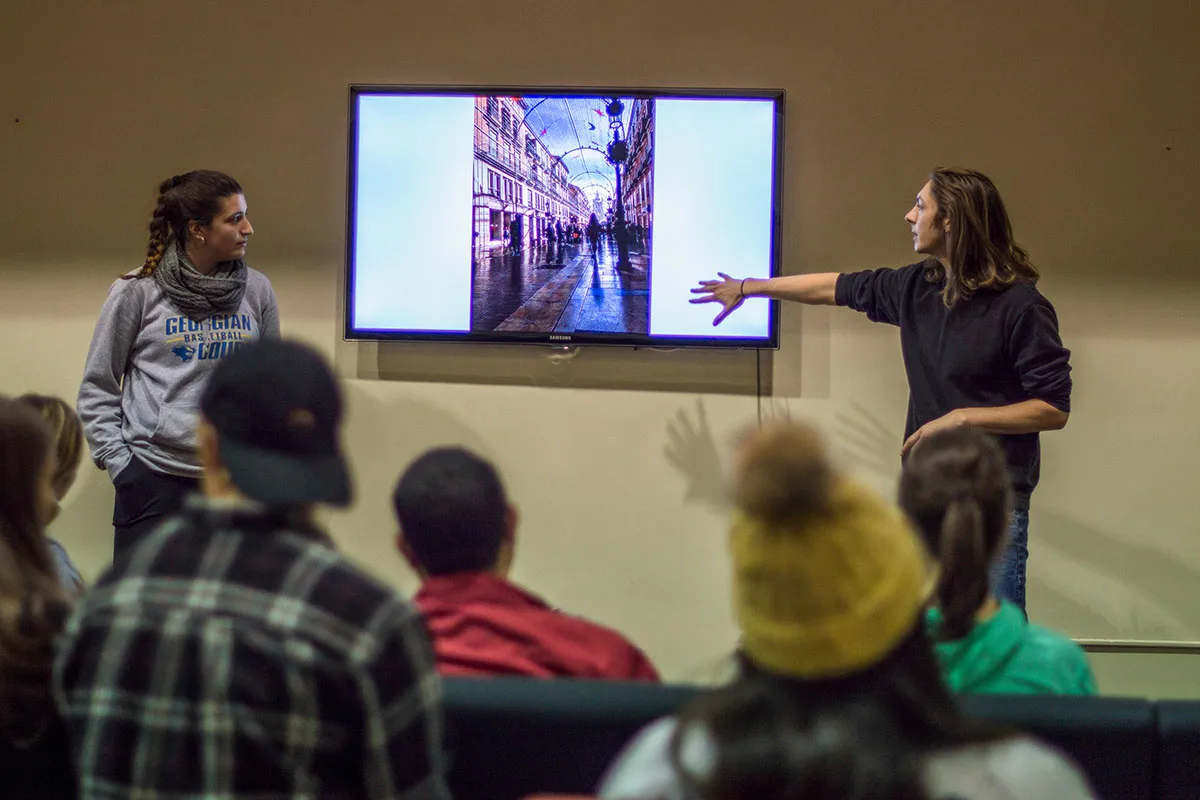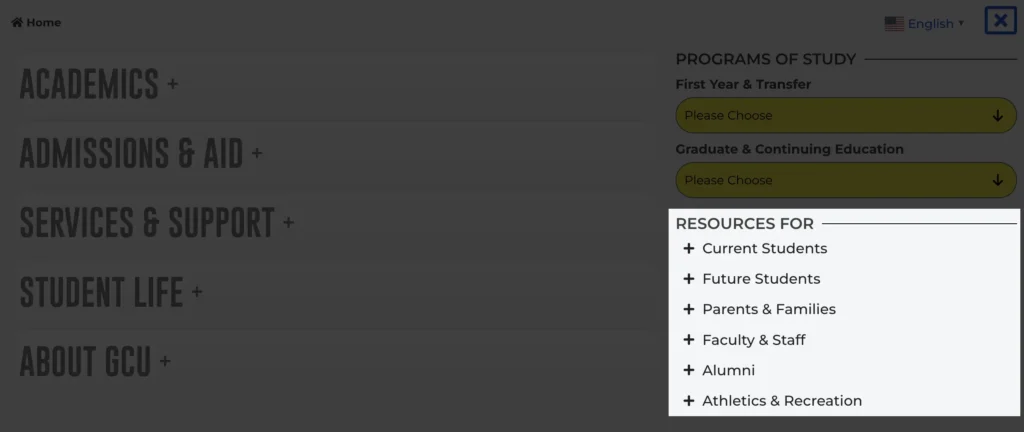Grants
Fund your
education
with grants

Grants don’t require repayment. That includes GCU’S need-based institutional grants

What Makes Grants a Good Choice?
Grants don’t need to be paid back, giving you the chance to pursue your education without worrying about debt. This sets grants apart from loans, which accrue interest over time. Available to students who meet certain criteria, grants allow you to focus wholeheartedly on your studies, enjoy extracurricular activities, and work toward reaching a fulfilling career. State and federal grants are available, and Georgian Court University offers institutional grants to eligible, full-time undergraduate students attending the Lakewood campus. All students interested in applying for grants must complete the FAFSA.
Looking for a Grant? First Submit the FAFSA!
In order to apply for and receive grants, you must complete and submit the Free Application for Federal Student Aid (FAFSA). The FAFSA determines your level of financial need and thus your eligibility for grants. Completion of the FAFSA is also required to receive loans, so it’s worth taking the time to fill it out if you wish to receive financial aid for paying for college. Pay close attention to the FAFSA submission deadline.


GCU Institutional Grants Help You Afford Your Education
Students attending Georgian Court University are able to pay tuition using not only state and federal grants but also GCU institutional grants. GCU grants are available to eligible full-time undergraduate students attending the Lakewood campus who have completed the FAFSA.
Federal and state grants
Generally reserved for students with high levels of need, the maximum Federal Pell Grant award is $7,395 per year and is available to undergraduates only. Visit studentaid.gov for more information.
Federal Supplemental Educational Opportunity Grants are for undergraduate students who demonstrate exceptional financial need. The grants range from $100 to $4,000 per year, with recipients of Federal Pell Grants receiving first consideration for these funds. FSEOG funds are limited and are awarded on a first-come, first-served basis. Visit studentaid.gov for more information.
Undergraduate students with financial need may be eligible to earn up to $2,000 per year in either on-campus or off-campus employment. Wages vary by employer. Earnings are paid directly to the student each month as work is performed; therefore, FWS awards are not subtracted from charges in the Office of Student Accounts. FWS funds and work-study positions are limited and are awarded on a first-come, first-served basis. Visit studentaid.gov for more information.
TAG provides assistance to needy full-time Georgian Court University undergraduates who have been residents of New Jersey for at least 12 consecutive months prior to receiving the grant and have filed the FAFSA. Annual award amounts for recent years have ranged from approximately $2,176 to $14,404 annually. Visit hesaa.org for more information.
Students who demonstrate a high level of academic achievement and attend high schools in New Jersey’s urban and economically distressed areas (as determined by the New Jersey Department of Education) will be considered for the Governor’s Urban Scholarship. Awards of $1,000 are made to students who are nominated for consideration by their high schools based on standard academic criteria. Recipients will be notified by HESAA in the fall of their senior year; awards may be renewed for up to eight semesters of full-time enrollment based on continued eligibility and available funding. Students do not need to reapply for award renewal. Visit hesaa.org for more information.
Educational Opportunity Fund (EOF) grants are funded by the state of New Jersey and provide assistance to needy full-time undergraduates residing in New Jersey. This competitive program assists students from educationally disadvantaged backgrounds who demonstrate the potential for success at Georgian Court University. Students must apply annually by June 1. For more information, visit georgian.edu/educational-opportunity-fund.
NJ STARS recipients who earn an associate degree from a community college with a cumulative GPA of 3.25 or higher, have a family income (taxable and untaxed income) less than $250,000, and meet all other program eligibility requirements may be eligible to receive an NJ STARS II award in the amount of $2,500 per academic year to transfer to a New Jersey TAG-participating college or university to earn a baccalaureate degree. Visit hessa.org for more information.
The federal Teacher Education Assistance for College and Higher Education (TEACH) Grant program provides up to $4,000 per year in grants for graduate and undergraduate students who intend to teach full time in high-need subject areas for at least four years after graduation at schools that serve low-income families. Students may receive up to $16,000 for undergraduate study. Graduate students are also eligible for $4,000 per year ($8,000 total). Part-time students are eligible, but the maximum grant will be prorated based on credits. Students must complete the four-year teaching commitment within eight years after graduation or repay the grant with interest. First-year students cannot apply. Visit studentaid.gov for more information.
Remember to Meet Deadlines!
Securing a grant requires that you meet certain application deadlines. Always be sure to verify deadlines and meet them. New students entering the university at the beginning of the academic year must submit a FAFSA by June 1 to receive consideration for fall and spring awards and by March 1 to receive consideration for spring-only awards (on a funds-available basis).
Other Ways To Afford Your Education

Financial Aid
GCU provides millions of dollars in merit and need-based awards to students every year. Find out how to access this aid and reach your full academic potential.

Scholarships
Georgian Court University invests up to $19,000 per student in scholarships each year to help make your college dreams a reality.

Work-Study
Federal and GCU work-study programs award students in the form of a paycheck for work they do in a position on campus.

Benefits for Veterans
The Office of Financial Aid’s Veterans’ Services is here to assist veterans, dependents of veterans, reservists, and National Guardsmen/Guardswomen with the benefits application process.

Calculate Your Cost of College Now
Net price refers to how much you’ll pay toward tuition in a single academic year after scholarships and grants (two forms of financial aid that you don’t have to pay back) are accounted for. By using GCU’s Net Price Calculator (NPC), you’ll have a good picture of how much federal, state, and institutional aid you may be eligible to receive. In as little as ten minutes, you can have an estimate of how much aid you could receive.
Apply For
Financial Aid
It all starts with the FAFSA. Get more tips to streamline the financial aid process.
Student
Accounts
Check out our Office of Student Accounts for information on making payments, important dates and deadlines, FAQs, and more.
Contact
Us
If you have any questions about your account or anything related to tuition and financial aid at GCU, please send us an e-mail.
HAVE QUESTIONS?
CONTACT US.
Office of Financial Aid Location
Scully Registration and Finance Center
900 Lakewood Avenue
Lakewood, NJ 08701
Campus Map
Contact Information
Phone: 732-987-2258
E-mail: financialaid@georgian.edu
Office of Financial Aid Hours
Monday-Friday: 8:30 a.m.–4:30 p.m.
Saturday: Closed
Sunday: Closed

